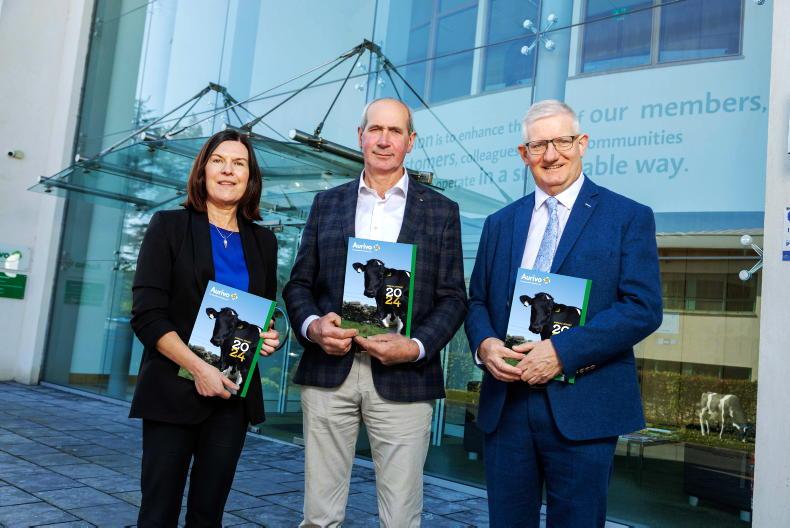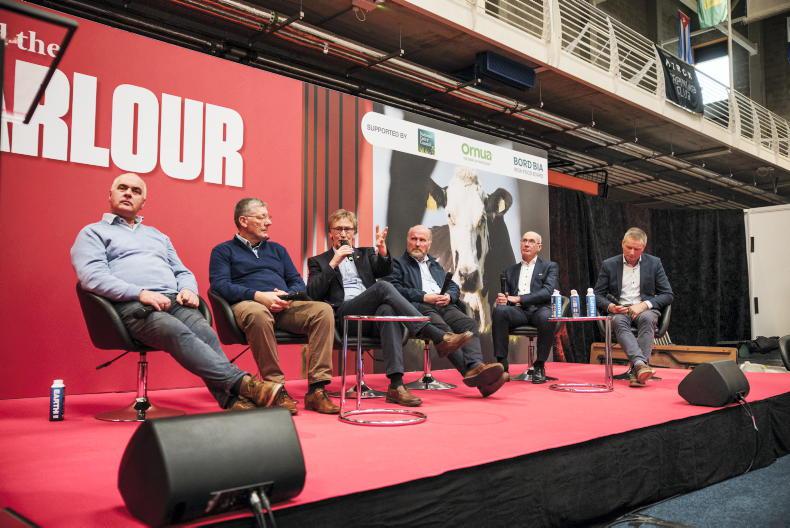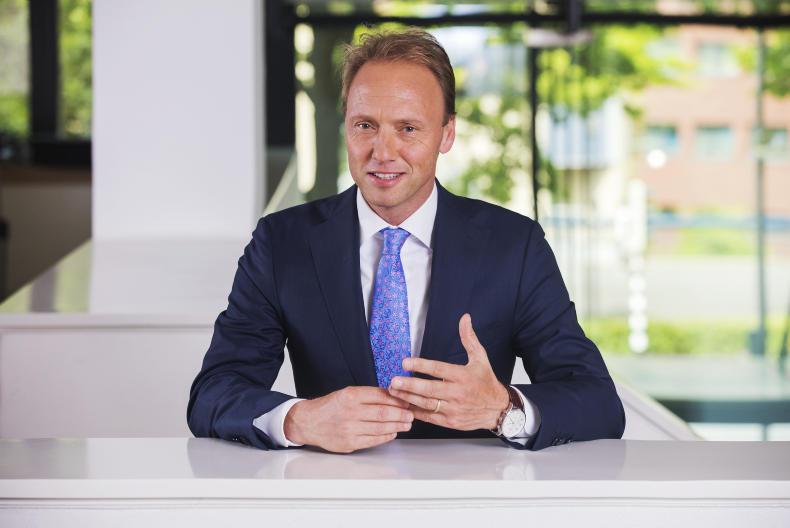Despite a welcome bounce in last week’s Global Dairy Trade (GDT) auction, the outlook on price remains poor.
The Irish Farmers Journal last week visited the chief executive of Dairygold Jim Woulfe for an update on its major construction activities at its Mallow and Mitchelstown facilities as well as Woulfe’s insights on those markets.
A positive but pragmatic man, with exceptional attention to detail, Woulfe insists that good times lie ahead of the current market problem, but that things could get worse before they get better.
Earlier last week, the board of Dairygold set a July milk price of 25.5c/litre. While another cut to farmers’ base price, it also represents a major watershed with the country’s second largest dairy processor dropping below 26c/litre for the first time since 2009.
Woulfe confirmed that Dairygold had supported milk price in the six months to June 2015, to the tune of €17m. He acknowledged that this support is being funded from a combination of planned profit reduction and cost savings, which will have a controlled and measured impact on 2015 financial performance.
“It will have an impact on the overall 2015 financial performance, but it will be an acceptable planned outcome in the circumstances. Our lenders are supportive because they can see the evidence of operational efficiencies and investment in advanced processing capability,” Woulfe said.
He added that the supporting of milk price would continue, but not indefinitely.
“It is critical, however, from a business perspective to maintain some proportionality with the market.”
Markets and outlook
It is accepted that dairy markets are weak and as a result prices paid to dairy farmers reflect that. Farmers have been informed, or conditioned, to expect a continuation of this trend for the foreseeable future.
Speaking to the Irish Farmers Journal last week, Lakeland Dairies CEO Michael Hanley went as far as predicting a nine-month continuation of this trend.
It appears that the news in Cork is the same as in Cavan, with Woulfe broadly agreeing with this outlook.
Citing that the GDT has seen dairy prices fall 65% since February 2014, with an over 30% drop since April 2015, Woulfe said it will be into 2016 before there is any meaningful recovery. He added that prices could be in the low 20c/litre next year.
“… suggest that the early 2016 dairy markets look likely to trend at or below the mid-20s cent per litre benchmark. This suggests a likelihood that it will be well into 2016 milk flow before the rebalancing currently, but slowly, getting underway begins to show meaningful upside,” Woulfe said.
“Dairy markets have always been cyclical and they will rebalance, typically in three- to five-year cycles. Ireland still has a real competitive advantage in our grass-based production system and our green credentials. In Dairygold, we have the scale to offer efficient processing and a diverse product portfolio, so we are well positioned to work through downturns and reap the benefit from upswings,” he added.
Consolidation
Consolidation is a difficult word for Dairygold. Over the past 12 months, Woulfe and his team led two unsuccessful attempts to merge, or consolidate, with other co-ops, namely North Cork and Arrabawn. While the attempts to partner up were rejected on both occasions, Woulfe still believes that consolidation is in the best interests of the sector.
“Dairygold supports industry consolidation,” he explained. “We see it potentially offering farmers substantial benefits and that is why we operate a co-processing agreement with GIIL and we are working closely with Ornua on its new Kerrygold Centre of Excellence (in Mitchelstown).
“Dairygold has also reached out to our neighbours, inviting them to discuss possible collaborations and we remain always open to engaging in collaboration initiatives that will benefit milk producers and members.
“However, significant industry consolidation is needed if Ireland is to deliver on its potential and if farmers are to benefit to the greatest degree. It will come, be it from a positive neighbour to neighbour engagement or out of the commercial realities of business. It is my view that collaboration is better strategically planned from positions of strength,” Woulfe said.
Expansion
Woulfe is now CEO of Dairygold for six years, having taken over from the controversial Jerry Henchy. Woulfe confirmed that there are some remaining legacy issues from the Henchy era and that he might have done some things differently, but that overall the co-op is in a good place.
Dairygold’s milk supply is up 14.3% since the end of March, with current weekly trends at +16% ahead of similar weeks in 2014.
This growth pattern is consistent with what Dairygold’s milk suppliers are forecasting, which has been underway since 2013, giving a two-year line of sight for planning future processing capacity.
Dairygold’s processing facilities in Mitchelstown and Mogeely, with some intake in Mallow, this year took the 2015 peak “in its stride” according to Woulfe.
“The quota regime put the brakes on large-scale processing investment across the industry. The investment taking place now will bring the benefits of lower-cost and improved processing efficiency.
“More particularly, in Dairygold’s case, the current investment brings a capability to deliver on added value food nutritionals growth objective to the business. This is more than investment to expand capacity. We are building the kind of high-end processing capability that will support the development of dynamic business to business relationships with world class international partners.”
Woulfe, the Dairygold management and its board signed off on a multimillion euro plan which will see major upgrading at its Mallow facility.
He does not see any need to rein in this plan in the face of testing times at present.
“On the investment side, we are geared for growth, processing efficiency and added-value product portfolio development. Our supporting agri-business capability is also performing well and Dairygold will continue to support farming by maximising farm returns to our milk producers and members across the region,” Woulfe said.
In that context, phase one of Dairygold’s Mallow regeneration will come on stream for 2016 milk flow. Alongside the capital investment programme, which is currently underway, the Society has been implementing a continuous improvement programme.
Read more
July milk price cuts hit hard
June milk league: Summer milk price cuts continue for Irish milk processors
GDT gain "a line in the sand" - IFA dairy chairman
Despite a welcome bounce in last week’s Global Dairy Trade (GDT) auction, the outlook on price remains poor.
The Irish Farmers Journal last week visited the chief executive of Dairygold Jim Woulfe for an update on its major construction activities at its Mallow and Mitchelstown facilities as well as Woulfe’s insights on those markets.
A positive but pragmatic man, with exceptional attention to detail, Woulfe insists that good times lie ahead of the current market problem, but that things could get worse before they get better.
Earlier last week, the board of Dairygold set a July milk price of 25.5c/litre. While another cut to farmers’ base price, it also represents a major watershed with the country’s second largest dairy processor dropping below 26c/litre for the first time since 2009.
Woulfe confirmed that Dairygold had supported milk price in the six months to June 2015, to the tune of €17m. He acknowledged that this support is being funded from a combination of planned profit reduction and cost savings, which will have a controlled and measured impact on 2015 financial performance.
“It will have an impact on the overall 2015 financial performance, but it will be an acceptable planned outcome in the circumstances. Our lenders are supportive because they can see the evidence of operational efficiencies and investment in advanced processing capability,” Woulfe said.
He added that the supporting of milk price would continue, but not indefinitely.
“It is critical, however, from a business perspective to maintain some proportionality with the market.”
Markets and outlook
It is accepted that dairy markets are weak and as a result prices paid to dairy farmers reflect that. Farmers have been informed, or conditioned, to expect a continuation of this trend for the foreseeable future.
Speaking to the Irish Farmers Journal last week, Lakeland Dairies CEO Michael Hanley went as far as predicting a nine-month continuation of this trend.
It appears that the news in Cork is the same as in Cavan, with Woulfe broadly agreeing with this outlook.
Citing that the GDT has seen dairy prices fall 65% since February 2014, with an over 30% drop since April 2015, Woulfe said it will be into 2016 before there is any meaningful recovery. He added that prices could be in the low 20c/litre next year.
“… suggest that the early 2016 dairy markets look likely to trend at or below the mid-20s cent per litre benchmark. This suggests a likelihood that it will be well into 2016 milk flow before the rebalancing currently, but slowly, getting underway begins to show meaningful upside,” Woulfe said.
“Dairy markets have always been cyclical and they will rebalance, typically in three- to five-year cycles. Ireland still has a real competitive advantage in our grass-based production system and our green credentials. In Dairygold, we have the scale to offer efficient processing and a diverse product portfolio, so we are well positioned to work through downturns and reap the benefit from upswings,” he added.
Consolidation
Consolidation is a difficult word for Dairygold. Over the past 12 months, Woulfe and his team led two unsuccessful attempts to merge, or consolidate, with other co-ops, namely North Cork and Arrabawn. While the attempts to partner up were rejected on both occasions, Woulfe still believes that consolidation is in the best interests of the sector.
“Dairygold supports industry consolidation,” he explained. “We see it potentially offering farmers substantial benefits and that is why we operate a co-processing agreement with GIIL and we are working closely with Ornua on its new Kerrygold Centre of Excellence (in Mitchelstown).
“Dairygold has also reached out to our neighbours, inviting them to discuss possible collaborations and we remain always open to engaging in collaboration initiatives that will benefit milk producers and members.
“However, significant industry consolidation is needed if Ireland is to deliver on its potential and if farmers are to benefit to the greatest degree. It will come, be it from a positive neighbour to neighbour engagement or out of the commercial realities of business. It is my view that collaboration is better strategically planned from positions of strength,” Woulfe said.
Expansion
Woulfe is now CEO of Dairygold for six years, having taken over from the controversial Jerry Henchy. Woulfe confirmed that there are some remaining legacy issues from the Henchy era and that he might have done some things differently, but that overall the co-op is in a good place.
Dairygold’s milk supply is up 14.3% since the end of March, with current weekly trends at +16% ahead of similar weeks in 2014.
This growth pattern is consistent with what Dairygold’s milk suppliers are forecasting, which has been underway since 2013, giving a two-year line of sight for planning future processing capacity.
Dairygold’s processing facilities in Mitchelstown and Mogeely, with some intake in Mallow, this year took the 2015 peak “in its stride” according to Woulfe.
“The quota regime put the brakes on large-scale processing investment across the industry. The investment taking place now will bring the benefits of lower-cost and improved processing efficiency.
“More particularly, in Dairygold’s case, the current investment brings a capability to deliver on added value food nutritionals growth objective to the business. This is more than investment to expand capacity. We are building the kind of high-end processing capability that will support the development of dynamic business to business relationships with world class international partners.”
Woulfe, the Dairygold management and its board signed off on a multimillion euro plan which will see major upgrading at its Mallow facility.
He does not see any need to rein in this plan in the face of testing times at present.
“On the investment side, we are geared for growth, processing efficiency and added-value product portfolio development. Our supporting agri-business capability is also performing well and Dairygold will continue to support farming by maximising farm returns to our milk producers and members across the region,” Woulfe said.
In that context, phase one of Dairygold’s Mallow regeneration will come on stream for 2016 milk flow. Alongside the capital investment programme, which is currently underway, the Society has been implementing a continuous improvement programme.
Read more
July milk price cuts hit hard
June milk league: Summer milk price cuts continue for Irish milk processors
GDT gain "a line in the sand" - IFA dairy chairman









SHARING OPTIONS